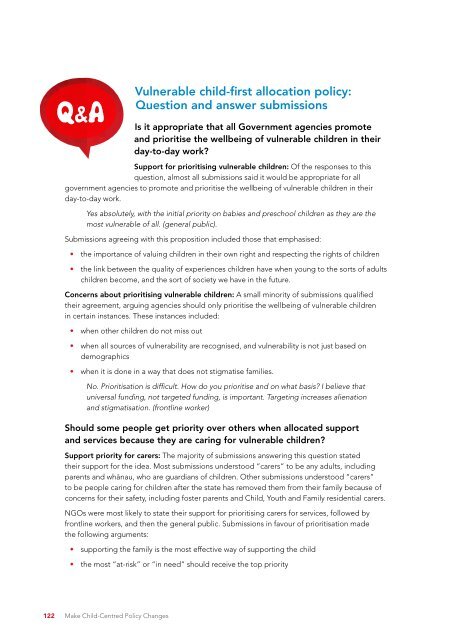The Green Paper for Vulnerable Children - Ministry of Social ...
The Green Paper for Vulnerable Children - Ministry of Social ...
The Green Paper for Vulnerable Children - Ministry of Social ...
Create successful ePaper yourself
Turn your PDF publications into a flip-book with our unique Google optimized e-Paper software.
Q&A<strong>Vulnerable</strong> child-first allocation policy:Question and answer submissionsIs it appropriate that all Government agencies promoteand prioritise the wellbeing <strong>of</strong> vulnerable children in theirday-to-day work?Support <strong>for</strong> prioritising vulnerable children: Of the responses to thisquestion, almost all submissions said it would be appropriate <strong>for</strong> allgovernment agencies to promote and prioritise the wellbeing <strong>of</strong> vulnerable children in theirday-to-day work.Yes absolutely, with the initial priority on babies and preschool children as they are themost vulnerable <strong>of</strong> all. (general public).Submissions agreeing with this proposition included those that emphasised:• the importance <strong>of</strong> valuing children in their own right and respecting the rights <strong>of</strong> children• the link between the quality <strong>of</strong> experiences children have when young to the sorts <strong>of</strong> adultschildren become, and the sort <strong>of</strong> society we have in the future.Concerns about prioritising vulnerable children: A small minority <strong>of</strong> submissions qualifiedtheir agreement, arguing agencies should only prioritise the wellbeing <strong>of</strong> vulnerable childrenin certain instances. <strong>The</strong>se instances included:• when other children do not miss out• when all sources <strong>of</strong> vulnerability are recognised, and vulnerability is not just based ondemographics• when it is done in a way that does not stigmatise families.No. Prioritisation is difficult. How do you prioritise and on what basis? I believe thatuniversal funding, not targeted funding, is important. Targeting increases alienationand stigmatisation. (frontline worker)Should some people get priority over others when allocated supportand services because they are caring <strong>for</strong> vulnerable children?Support priority <strong>for</strong> carers: <strong>The</strong> majority <strong>of</strong> submissions answering this question statedtheir support <strong>for</strong> the idea. Most submissions understood “carers” to be any adults, includingparents and whānau, who are guardians <strong>of</strong> children. Other submissions understood “carers”to be people caring <strong>for</strong> children after the state has removed them from their family because <strong>of</strong>concerns <strong>for</strong> their safety, including foster parents and Child, Youth and Family residential carers.NGOs were most likely to state their support <strong>for</strong> prioritising carers <strong>for</strong> services, followed byfrontline workers, and then the general public. Submissions in favour <strong>of</strong> prioritisation madethe following arguments:• supporting the family is the most effective way <strong>of</strong> supporting the child• the most “at-risk” or “in need” should receive the top priority122 Make Child-Centred Policy Changes
















